A midnight book party for Guillermo del Toro and Chuck Hogan‘s The Strain (William Morrow, 6.2), the first installment of an epic vampire trilogy, will happen on Monday, 6.2, at Meltdown Comics (7522 West Sunset Blvd., West Hollywood, CA). GDT is flying in from New Zealand to attend the event.
Month: May 2009
As Previously Noted
In Contention‘s hard-working Kris Tapley has assembled a new Oscar column and prediction update. I’d do a response piece but my battery will be drained in 15 minutes or so…the truth.
Reminder
Before Sacha Baron Cohen‘s Bruno there was Mike Myers‘s Dieter — both German/Austrian effeminate types who have a fashion-art TV show Myers backed out of making a Dieter movie called Sprockets, most of us recall, which was based on an old SNL routine. (Thanks to Jeffrey Ressner for reminding.)
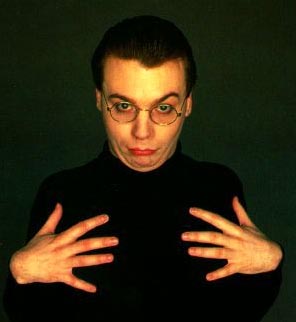
Praise for Gaspar
“Ultimately, the winners of the main competition represent just one part of the festival equation,” Eric Kohn has concluded on The Wrap. “The grandest Cannes event, as far as I’m concerned, arrived on Friday afternoon at the premiere of Gasper Noe’s Enter the Void.
“This two-and-a-half hour opus needs to be scaled down a bit, but there’s no doubt that the movie represents a highly unique viewing experience. Noe forces his audience to contemplate major themes about life after death with a tricky formalism that exists on a plane of its own. Is it the ‘best’ movie at Cannes? No, but it sure did help keep the energy flowing at the very end. For those lucky enough to have seen it, the appeal speaks for itself.”
Otherwise Engaged
Out of touch with everything except an extreme concentration on northern Morocco’s coarse and winding roads (and being careful not to hit the various cows, steers, goats, sheep and burros who graze alongside and occasionally cross them), I’ve just learned of the 62nd Cannes Film Festival jury’s decision to hand the coveted Palme d’Or to Michael Haneke‘s The White Ribbon.
You could call Ribbon a bit stern and frosty, but it’s got a river running through it that contrasts with the utter lack of an undercurrent in Quentin Tarantino‘s Inglourious Basterds. Shot in black-and-white and set in a rural German village around 1914 or so, it’s basically about subliminal class hatred and antagonism between the working stiffs and the rich. You can feel Bolshevism just around the corner in a land to the east, and the disregard and contempt that the haves show the have-nots to this day.
The White Ribbon, in short, is a film that’s not only “about something,” but something that stays with you. It isn’t nearly as intriguing and delightful to bathe in as Pedro Almodovar‘s Broken Embraces — easily my favorite festival film — but that’s the Cannes jury mentality for you.
The Variety story said that Haneke received his first Palme last night from the “visibly delighted” jury president Isabelle Huppert, who was described blindly and second-handedly by a fellow juror as a “fascist.”
The story reported that Huppert, “looking visibly tense onstage, referred to ‘an unforgettable week’ and ‘several hours, uh, several moments of deliberation.'” One jury member told a Variety reporter that “it [was] the worst jury experience he’d ever had.”
Jacques Audiard‘s A Prophet won the Grand Prix award. Hearty congrats and a final acknowledgement that I have a gift — you really have to call it that — for missing at least one important Cannes competition film each year. One way or another, I manage it.
Inglourious Basterds costar Christoph Waltz fully deserved his Best Actor award as Colonel Landa, a brilliant Nazi fiend, in Tarantino’s film.
I don’t quite understand much less agree with the Ecumenical Jury’s decision to give Lars von Trier‘s Antichrist an “anti-prize” for being “”the most misogynist movie from the self-proclaimed biggest director in the world.” I’m not denying Von Trier’s tendency to make his female characters suffer horribly in his films, but I only had thoughts of my own suffering while watching Antichrist. But handing out such an award is certainly brassy and amusing. French director Radu Mihaileanu explained that “we cannot be silent after what that movie does.”
And the Cannes jury giving their best actress actress award to Charlotte Gainsbourg for her Antichrist performance is…I don’t know what that was about. I felt hugely sorry for Gainsbourg all through my watching of that film. Giving her an award for what she does in it (including scissoring off her clitoris) is truly perverse.
Brillante Mendoza winning the best director award for Kinatay and Lou Ye‘s Spring Fever winning for best screenplay are two more odd-freak calls.
On The Road

On hill overlooking Las Negras — Saturday, 5.23, 8:40 pm.
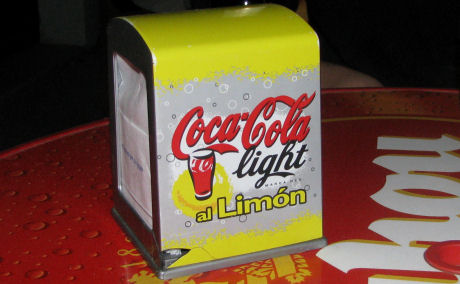
314th reason why European culture is better than U.S. culture: they still sell Coke Limon over here. Americans shunned my all-time favorite soft drink after a year or so of market sampling. They go for Dr. Pepper, beer, Sprite, Coke Zero, Fanta but not the greatest tasting Coca Cola hybrid of all time.
Grief, Dinos…Say Again?
A guy with relatively close proximity to Terrence Malick‘s Tree of Life has confimed what is common knowledge in some circles but has never been rock-solid confirmed, which is that, yes, there is a dinosaur sequence. “Apparently the depth of the father’s (Brad Pitt) grief when [reason conveyed but omitted here] is so great that the film goes back to the beginning of time and charts evolution…I guess this includes dinosaurs,” the Cannes guy says.
He also says the film is definitely “coming out in ’09. The IMAX stuff takes up around 40 minutes and they are currently raising the money.”
Need That Schwing
I feel less negatively about Sam Mendes‘ Away We Go (Focus Features, 6.25) than Variety ‘s Dennis Harvey, who yesterday called it “a digression into loose, anecdotal Amerindie-style terrain” for Mendes and an “oddly sour, unappealing road-trip scenario” costarring John Krasinski and Maya Rudolph.
I found it okay, not bad, mildly diverting, somewhat engaging, etc. I know — damnation with faint praise, right? I was going to wait until later in the month but Harvey forced it.
Krasinki and Randolph play a pair of intelligent, vaguely likable, moderately appealing 30something couple with definable brains and souls. But as actors they exemplify, I think, what you don’t want to do when you’re casting your leads. The bottom line is that they’re both supporting players without any leads to play with or against. This is obvious from the trailer. They just don’t have that special chemistry-slash-empathy factor that leading actor types always seem to radiate.
“Penned by first-time scribes, alt-lit favorites and real-life spouses Dave Eggers and Vendela Vida,” Harvey notes, “pic will likely find some defenders, particularly among the authors’ fans. Still, its theatrical career launching June 5 looks to be short with ancillary prospects modest.”
The Man
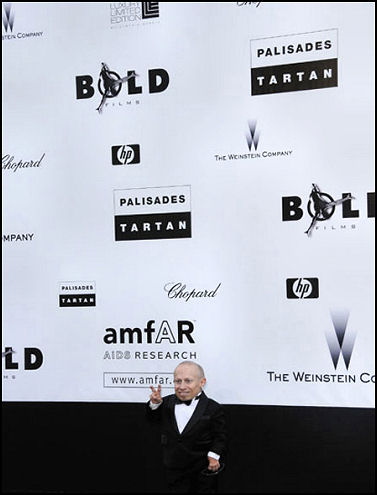
Verne Troyer (a.k.a. “Mini-me” in the Austin Powers films) at Thursday’s AMFAR benefit bash in Cannes.
South of Aqaba
Las Negras, a small village on the coast of Andalucia in southeastern Spain, is in the dry area of the Cabo de Gata (Cape of the Cats). It’s located about 20 or so kilometres south of Playa Agorobico, which was the area that David Lean used to stage the attack on Aqaba in Lawrence of Arabia, requiring the construction of a semblance of the Moorish-themed town as it existed in 1917 or thereabouts. Alas, the coastal headland has been spoiled by an illegally built hotel which has been threatened with demolition.
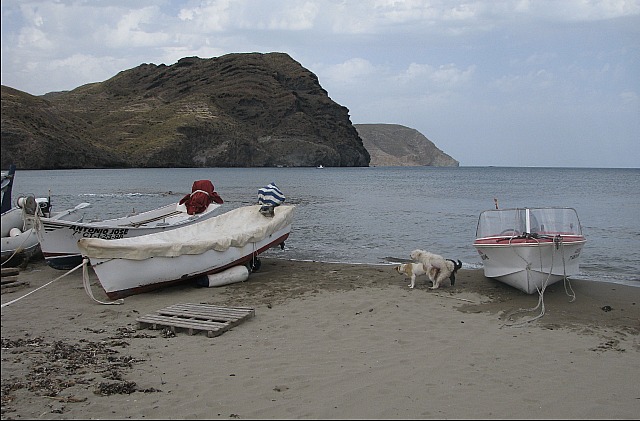
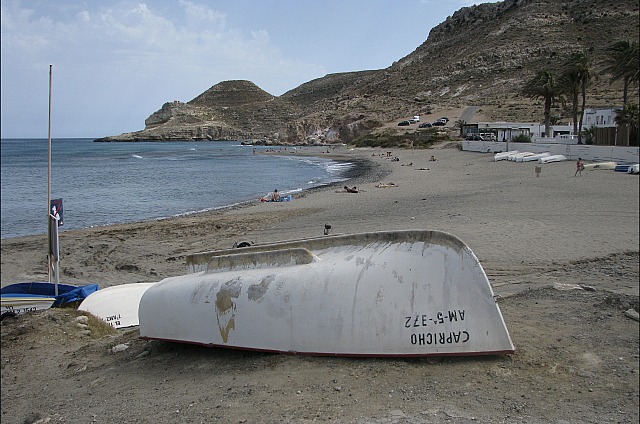
Noe’s Death Trip
“I know what it’s like to be dead” is one of John Lennon‘s more famous lyrical lines. Now, with his Cannes-screened Enter The Void, director Gaspar Noe has also laid claim to having an imaginative knowledge of the after-realm, which might be summarized as “I know what it’s like to be dead and reborn.”
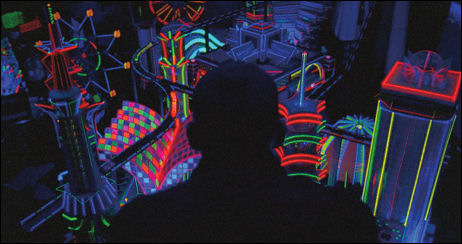
And it’s fascinating, to hear it from Moving Pictures magazine’s Eric Kohn. The problem, however, is that “no movie in recent memory [has] simultaneously outstayed its welcome and felt so fresh in nearly every scene.
“In a rare film accomplishment, No√©’s Enter the Void inspires feelings of awe, disgust, contemplation and annoyance — sometimes all at once,” he observes.
“The movie begins from the perspective of a young, American drug dealer named Oscar (Nathaniel Brown), who lives in Tokyo with his sister (Paz de la Huerta). The camera adopts his perspective, jutting to black as it mimics his blinks and even muffling his voice to make it sound like the viewers are inside his head.
“The downbeat stoner gets high and heads out to a bar with a friend. Along the way, they have a cosmic discussion about the Tibetan Book of the Dead, sounding like a couple of aimless druggies with little connection to reality. But their discussion ends up having highly profound implications. Soon, the dealer is dead, lying in a pool of his own blood in the bathroom of the bar. And yet the camera maintains his perspective, and that’s when things start to get really far out.
“Oscar’s viewpoint drifts out of his body to explore his surrounding environment, where he witnesses the fallout of his demise.
“His sister, an erotic dancer whose seedy lifestyle caused Oscar to become a drug addict in the first place, veers into depression. Meanwhile, Oscar starts to think back on his childhood before flashing back to modern times, witnessing some nifty-looking colors and ultimately getting reborn as the spawn of his sister and best friend. Trust me, spoilers are important when recommending No√©’s movie. It’s worth seeing simply for its intense application of one gimmick the whole time, but you need to know that it does end after a while — after two hours and 30 minutes, actually.
Borrowing from the aesthetics of Cloverfield, first-person shooters and the extreme long-take style of Mike Figgis‘ Timecode, Noe’s audacious work begs for big-screen treatment, a patient audience and a willingness to give the director a certain amount of leeway. In concept, it’s just plain dumb. In execution, it’s somewhat pretentious and far too ambitious. In the right frame of mind, however, Enter the Void offers a wholly original twist on the role of spectatorship in storytelling. Love it or hate it, the movie succeeds as a radical experiment in film form.
“When the flashbacks begin (and the movie adopts a third-person view), Noe settles into a relatively basic pattern, jumping back and forth from Oscar’s memories to his perspective in the present. Then, right when you expect the director to wrap things up, it gets even nuttier. We are given the privilege — if it can be described in that manner — of witnessing Oscar’s re-conception as it happens, including a shot from inside his sister’s womb as a penis enters her and shares the seed that will bring him back to the world. It’s like Look Who’s Talking gone NC-17 and avant-garde.
“Beyond its unique construction, Enter the Void also functions as a dedicated provocation. With loads of graphic sex and even an onscreen abortion, the movie led many in its Cannes audiences to suggest that it ups Lars von Trier‘s Antichrist as the most controversial entry at the festival. Maybe, but it’s the core idea of the production — death as the ultimate drug trip — that ought to take the spotlight.”



